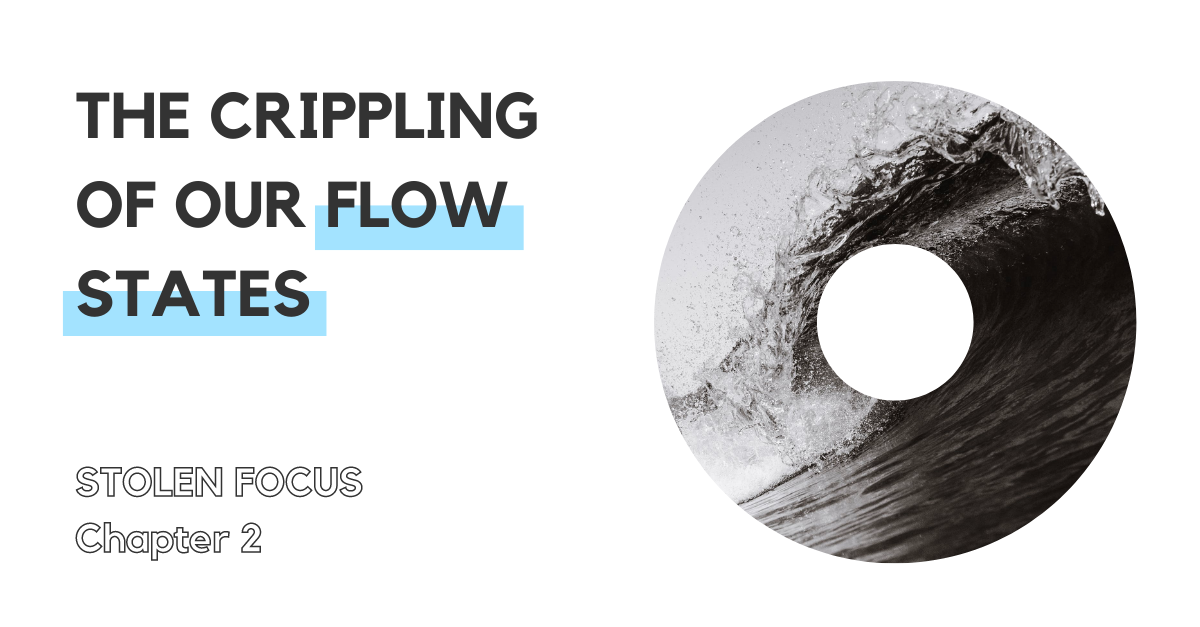‘[When] approaching death… you’ll think about your moments of flow’ – Stolen Focus, Chapter 2 Notes
Posted on: June 3, 2022
Post Category: Book Notes

About #onepageonepoint
#onepageonepoint aims to summarise new ideas from books on personal and professional development – with (approximately) one point for each page. Read more about this project here.
Today for #onepageonepoint, we have summary notes for Stolen Focus – for chapter 2: ‘Cause 2: The Crippling of Our Flow States’.
If you are interested in getting yourself a copy or learn more about the book, click here.
Chapter 2: ‘Cause Two: The Crippling of Our Flow States’
- ‘Narcissism… is a corruption of attention – it’s where your attention becomes turned in only on yourself and your own ego… Every day in my normal life – sometimes several times a day – I would look at Twitter and Instagram to see how many followers I had. I didn’t look at the feed, the news, the buzz – just my own stats.’ (Hari 2022, p. 44).
- In Hari’s interview with Professor Gloria Mark, she explains ‘if you have spent long enough being interrupted in your daily life, you will start to interrupt yourself even when you are set free from all these interruptions’ – to which Hari realised: ‘Texts, Facebook messages, phone calls – they were al little ways in which the world seemed to say: I see you. I hear you. We need you. Signal back. Signal more.’ (Hari 2022, p. 45).
- It was a breakthrough discovery that humans can focus for long periods of time without putting in too much effort. This discovery was made by Mihaly Csikszentmihalyi (pronounced cheek-sent-me-high-ee).
- Prior to Mihaly’s discovery, American psychology was dominated by an idea discovered by B. F. Skinner. B. F. Skinner discovered that behaviours can be taught and repeated by giving the right rewards. This implied that people do not select what to pay attention to at will, but are the sum of all reinforcements they have experienced in their life – and can be reprogrammed in any way that a clever designer wants.
- Mihaly contradicted this (mechanical idea and manipulative vision) after proposing the idea of the ‘flow state’: ‘when you are so absorbed in what you are doing that you lose all sense of yourself, and time seems to fall away, and you are flowing into the experience itself’ (Hari 2022, p. 51).
- He discovered if human beings drill down in the right way, we can be hit by a gush of focus that can carry us through difficult tasks – making it painless and pleasurable.
- Mihaly identified many aspects of flow but Hari boils it down to three core elements: (1) a clearly defined goal that you are monotasking towards, (2) you are focussing on something that is meaningful to you, and (3) the work is something that is at the edge of your abilities but not beyond them.
- Flow makes you feel present and experience a loss of self-consciousness; it removes your ego, allows you to merge with the task, and it makes you feel better.
- Today we have manifestations of both theories conflicting with each other: our devices, the internet and social media (based on Skinner’s vision of how the mind works) versus a force (an extraordinarily fragile and easily disrupted state) within ourselves that allows us to focus for long stretches and be happier and healthier.
- Forces, internal and external, can disrupt flow; Mihaly discovered that staring at a screen on average provides the lowest the amount of flow.
- Hari started writing more, and after a week he was pushed by the state of flow, which ended up helping him relax, engage and open his mind: ‘To recover from our loss of attention… we need to strip out our distractions and… replace them with sources of flow’ (Hari 2022, p. 57).
- ‘When you are approaching death, I thought to myself, you won’t think about your reinforcements – the likes and retweets: you’ll think about your moments of flow’ (Hari 2022, p. 58)
- ‘Fragmentation makes you smaller, shallower, angrier. Flow makes you bigger, deeper, calmer. Fragmentation shrinks us. Flow expands us.’ (Hari 2022, p. 58).
If you are interested in getting yourself a copy or learn more about the book, click here.
Interested in reading more? See my notes for Chapter 3.

About the author
Jason Khu is the creator of Data & Development Deep Dives and currently a Data Analyst at Quantium.